Index relies entirely on the support of donors and readers to do its work.
Help us keep amplifying censored voices today.
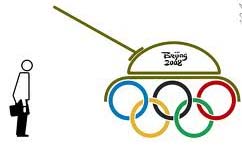 Despite talk of reform, the Bahrain Grand Prix and the Beijing Olympics proved to be catalysts for rights abuses. Mihir Bose asks whether human rights should be a criterion for hosting coveted international sporting events
Despite talk of reform, the Bahrain Grand Prix and the Beijing Olympics proved to be catalysts for rights abuses. Mihir Bose asks whether human rights should be a criterion for hosting coveted international sporting eventsOn the evening of 13 July 2001, as Beijing held a press conference in Moscow to celebrate securing the 2008 Olympics, they had an unexpected visitor: François Carrard, the Swiss lawyer who was executive director of the International Olympic Committee (IOC). Normally on such occasions the IOC keeps its distance and lets the victorious city have its moment in the sun. But Carrard felt he had to address the media on the human rights issue.
In the lead-up to the vote, Beijing’s rivals, in particular Toronto and Paris, had made much of China’s human rights record. As the members gathered, some 50 protesters assembled outside chanting “Free Tibet”. The Russian police, some wearing riot gear, broke up the protest and six people were seen being taken away in a waiting bus after demonstrators tried to unfurl three banners on the Moscow River embankment, opposite the World Trade Centre where the IOC was meeting. There were reports of 12 arrests.
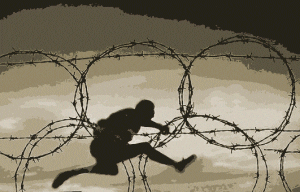 The IOC had so far refused to discuss human rights, arguing that it was only concerned with making a decision about sport. Nor was the issue addressed by the Evaluation Commission that visited the bid cities and whose assessment formed the basis of the IOC members’ decision. The report of the commission was crucial as, following the revelation of the 1998 Salt Lake City corruption scandal in which IOC members were accused of taking bribes, they were subsequently barred from visiting bid cities. Just before the vote for the 2008 Games, Hein Verbruggen, the Dutch chairman of the Evaluation Commission, summarised to his fellow members the various potential risk factors of the bidding cities. But he did not mention human rights.
The IOC had so far refused to discuss human rights, arguing that it was only concerned with making a decision about sport. Nor was the issue addressed by the Evaluation Commission that visited the bid cities and whose assessment formed the basis of the IOC members’ decision. The report of the commission was crucial as, following the revelation of the 1998 Salt Lake City corruption scandal in which IOC members were accused of taking bribes, they were subsequently barred from visiting bid cities. Just before the vote for the 2008 Games, Hein Verbruggen, the Dutch chairman of the Evaluation Commission, summarised to his fellow members the various potential risk factors of the bidding cities. But he did not mention human rights.
Beijing did face a question on human rights during its presentation. But this was delivered in such a roundabout way that only seasoned IOC observers could have understood it. Roland Baar, a rower from Germany, raised the ethical issue of playing beach volleyball in Tiananmen Square. Beijing had proposed this idea, but it had been shelved after objections from the Evaluation Commission that it was not a suitable venue. Baar was so circumspect that he did not even utter the words “Tiananmen Square”, lest it offend the Chinese.
But now Carrard felt free to talk about human rights. At the press conference, apologising profusely for intervening at the Chinese party, he revealed, “On human rights we had two choices — a decision we close the door and that is a hugely respectable decision. The other way is to bet on openness. We bet that in seven years’ time the interactions, the progress and the development will be such that human rights can be improved.”
Long before the Beijing Olympics was staged it was clear that this was an impossible bet, and in the end Jacque Rogge, who was elected president of the IOC a few days after the vote in Moscow, made it clear that it was no business of the committee to monitor China’s moral development. Indeed, Rogge confessed that the IOC neither had the power nor the ability to do anything on human rights. The result: China rode out the protests that accompanied the Games, in particular the ones that marked the torch relay. China, as it had always planned, used the Games to show they could take the Olympics, a western invention, and do it better. By the end of it, IOC members were applauding the Games as China’s giant coming-out party and declaring the bar had been raised to such an extent that other countries would struggle to match it. All talk of human rights and opening up the country had vanished.
The fact was that the Games went to Beijing not because the Olympic movement thought it could change China, but because of wider geopolitical considerations. The overwhelming view of IOC members was that the Games had to go to the most populous country in the world. China had been a good Olympic member. Whatever its human rights record, there was no Olympic reason to refuse the bid. There was also a fear that Beijing, having failed in 1993 when it lost to Sydney by two votes, might walk out of the Olympics if China did not succeed this time.
There was a dominant view in the Olympic movement that, with the collapse of the Soviet Union, a strong China was needed to balance the all-powerful Americans. Ivan Slavkov, the IOC member from Bulgaria — later expelled from the movement in 2005 when he was caught by an undercover reporter saying he would take bribes in exchange for votes — said at the time: “We need China to act as a check on the US. The US is the only superpower. It dominates everything, including the Olympics and the medal tables. China is coming up fast and, by giving the Games to them, we can make sure they develop in the right direction.”
The IOC’s dance round the issue of human rights over the decades illustrates a wider problem for all sports organisations faced with such ethical concerns. The classic example of this was the 1936 Berlin Olympics. The award of the Games to Berlin was intended to symbolise the re-admission of a peaceful, democratic Germany to the family of nations after the horrors of the First World War. By a supreme irony, the Games have gone down in history as a triumph of Nazi propaganda. As the official Olympic-Zeitung proudly asked on 19 August 1936: “Do we have to point out that the great victor at the Olympic Games is Adolf Hitler?”
The 1936 Olympics, which left us the legacy of the torch relay, offers a template for the use of sport for ulterior purposes with its extraordinary mixture of opportunism, improvisation and attention to detail in the Nazi preparations for the Games. But Hitler could not have fulfilled his agenda to show how normal his regime was if leaders of international sport had not played into his hands, with their willingness to believe dishonest public assurances and to accept gestures and symbols rather than look at reality.
Since then, sports leaders have often looked the other way when major sporting events are held against a background of state violence, in countries whose repressive regimes seek to present themselves as open societies to the outside world. The list includes rebel South African cricket tours of the apartheid era, financed by tax concessions by the white regime, the 1968 Mexico Olympics, the Ali-Foreman fight in 1974 in a Zaire ruled by the brutal and corrupt despot Mobutu Sese Seko, and the 1978 World Cup in Argentina, organised by a junta which, even then, was embarking on a massive programme of killing people opposed to the regime.
Back in 1851, when Prince Albert wished to advertise the might of Queen Victoria’s realm he held a Great Exhibition — essentially a trade fair displaying the works of industry of all nations. There was culture in the form of Charlotte Bronte, Lewis Carroll and George Eliot, but no sport.
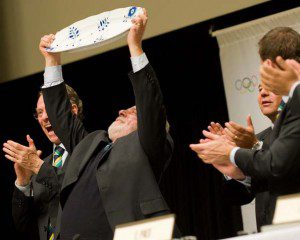 Today, sporting events have come to replace trade expos as a symbol of national success. Nelson Mandela used the power of sport, particularly rugby, to woo the whites, and felt that the rainbow nation had arrived when in 2010 it became the first African country to stage the football World Cup. In Copenhagen in 2009, President Lula of Brazil shed tears after Rio won the right to stage the 2016 Olympics. “Everybody talks of Brazil as the country of tomorrow,” he said. “Here in Copenhagen tomorrow has arrived.” His pleasure was all the greater as Rio had beaten Barack Obama’s Chicago, despite the fact that the most powerful man in the world made a personal plea to the IOC.
Today, sporting events have come to replace trade expos as a symbol of national success. Nelson Mandela used the power of sport, particularly rugby, to woo the whites, and felt that the rainbow nation had arrived when in 2010 it became the first African country to stage the football World Cup. In Copenhagen in 2009, President Lula of Brazil shed tears after Rio won the right to stage the 2016 Olympics. “Everybody talks of Brazil as the country of tomorrow,” he said. “Here in Copenhagen tomorrow has arrived.” His pleasure was all the greater as Rio had beaten Barack Obama’s Chicago, despite the fact that the most powerful man in the world made a personal plea to the IOC.
But the problem for sport is that, unlike expos, it carries a moral dimension. It is interesting to note that Beijing’s rivals made much of this distinction. Claude Bébéar, president of the Paris bid, made it clear he would have no problems with a Chinese city hosting an expo, but not the Olympics. Giving China the Games, he argued, would indicate moral approval for the regime.
The idea that sport had universal significance emerged only in the 19th century as the rules for modern sports were being formulated. In his fictional novel Tom Brown’s Schooldays, Thomas Hughes presented his headmaster at Rugby, Thomas Arnold, as a sporting guru. His message, said Hughes, was that sport could reach out beyond the playing fields more effectively than any other form of human activity. Indeed, sport could shape society for the greater good.
The headmaster of Hughes’s book was an invention — the real life Arnold had no interest in sport. But the idea proved so powerful that it seduced a French baron, Pierre de Coubertin, who came to Rugby to worship at Arnold’s shrine and used his principles to revive the Olympics, setting it a high political goal. As he put it:
It is clear the telegraph, railways, the telephone, the passionate research in science, congresses and exhibitions have done more for peace than any treaty or diplomatic convention. Well, I hope that athletics will do even more … let us export runners and fencers; there is a freetrade of the future, and on the day when it is introduced within the walls of old Europe the cause of peace would have received a new and mighty stay.
Modern sport is essentially the marriage of Hughes’s big idea in the private realm – that sport develops character — with Coubertin’s big idea in the public realm — that sport can transmit values within and between nations through regular international competition.
The problem arises when sport collides with political reality, as it did in the wake of the Arab spring. As millions rose up in the Arab world last year to challenge and even change their despotic rulers, in Bahrain the desire for freedom came into conflict with modern sport. In the picturesque words of the Daily Mail’s Martin Samuel, the result of “little brown people” wanting freedom meant “the next thing you know is there is one less place for rich white guys to race cars”.
Formula One’s first Grand Prix of the season was due to take place in Bahrain in March, just weeks after the kingdom had been engulfed by protesters demanding more freedom. There had been highly publicised protests at the main Pearl Roundabout in the financial district of Manama with some 31 protesters killed. Armoured cars, including Saudi troops and forces from Qatar and UAE, had rolled into the kingdom to restore order. How could a sports event take place in such a climate? And where was the moral compass of sport in even thinking it could?
The race was the dream of Crown Prince Sheikh Salman bin Hamad bin Isa al Khalifa, who had made it clear that money was no object in bringing one of the most high profile world events to his desert kingdom. The Bahrain government funded the race. The Sakhir circuit, where the Grand Prix had been run since 2004, had cost some £92m. The F1 organisers had been paid £24.6m to allow Bahrain to organise the opening race of the 2010 season, and this had risen by 60 per cent for the 2011 race. The protesters knew how dear the race was to the Crown Prince and that if they wanted to wring political concessions from him, they had to hit at his beloved sport.
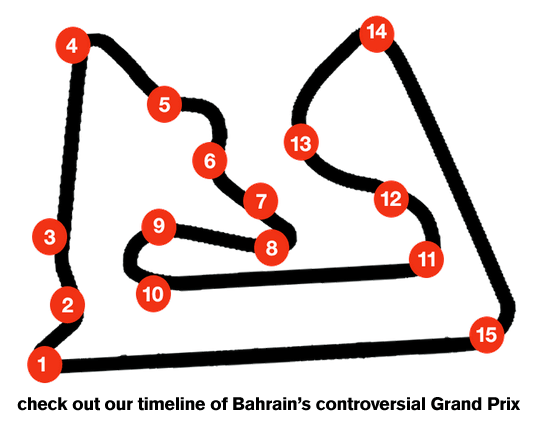 However, the F1 organisers of the race did not seem to understand the moral questions involved. Neither FIA, the governing body, nor Bernie Ecclestone — the F1 rights holder — wanted to put their heads above the parapet. Their reluctance, it was assumed, was due to the fear that if they cancelled the race they would stand to lose £37m in rights fees.
However, the F1 organisers of the race did not seem to understand the moral questions involved. Neither FIA, the governing body, nor Bernie Ecclestone — the F1 rights holder — wanted to put their heads above the parapet. Their reluctance, it was assumed, was due to the fear that if they cancelled the race they would stand to lose £37m in rights fees.
In the end, the Crown Prince himself decided the race had to be put back, hoping it could be held later in the year. His wish appeared to have been granted when, following an FIA inspection team visit, FIA’s World Council unanimously agreed that the Bahrain Grand Prix would now be held on 30 October. The decision provoked outrage from human rights activists and race fans. Many argued that for all the talk of high values, sport was more bothered about Mammon and ended up conspiring with despots.
The FIA’s judgement was further called into question when details of the inspection report emerged. Over a two-day trip, the FIA had met the minister of culture and tourism, the minister of the interior, had had lunch with the board that runs the Grand Prix, met circuit personnel and visited a shopping centre. But they had not met any of the dissidents. It was clear that the race could now not go ahead at the rescheduled date either. However, it was logistics not morality that was given as the reason for the cancellation. The new date for the race in October meant Bahrain would get India’s Grand Prix schedule – the new Formula One commercial centre – and extend the calendar into December. The teams just could not cope with the pressures this would create.
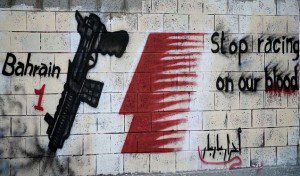 The whole affair brought little credit to Formula One, least of all the highly paid drivers. Apart from Red Bull’s Mark Webber, who acknowledged the moral question of sport taking place in the wake of a bloodbath, nearly all the other drivers avoided the moral issue. I could not even coax Britain’s most successful F1 driver, Nigel Mansell — who has chalked up 31 race wins and the 1992 world title — to take a stand on this issue. When I asked in the middle of the crisis whether it would be morally justified to stage the Bahrain Grand Prix, Mansell replied: “There are great people involved in Formula One who are in charge and it is up to them to speak to the power brokers of the country.”
The whole affair brought little credit to Formula One, least of all the highly paid drivers. Apart from Red Bull’s Mark Webber, who acknowledged the moral question of sport taking place in the wake of a bloodbath, nearly all the other drivers avoided the moral issue. I could not even coax Britain’s most successful F1 driver, Nigel Mansell — who has chalked up 31 race wins and the 1992 world title — to take a stand on this issue. When I asked in the middle of the crisis whether it would be morally justified to stage the Bahrain Grand Prix, Mansell replied: “There are great people involved in Formula One who are in charge and it is up to them to speak to the power brokers of the country.”
The problem here, as Max Mosley, the former head of FIA, astutely put it was:
The Formula One world did not seem to appreciate that the government in Bahrain was about to use the Grand Prix in support of suppressing human rights.
For all the moral high ground Formula One may like to claim, when faced with a stark ethical issue it is powerless and has to duck and dive. The same drama has played itself out again this year, with F1 facing international condemnation for holding the race in Bahrain.
Sports administrators may present themselves as the Vatican of sport, beyond the control of any authority but their own. Yet the money needed to run modern sport means they have to compromise with dubious governments and regimes. The result is that the high moral purpose of sport is sacrificed if not totally ignored. And until sport can deal with this basic contradiction, problems such as Bahrain will continue to appear. The worrying thing is that few in sport seem willing or able to deal with it.
 Mihir Bose is the author of The Spirit of the Game: How Sport Made the Modern World (Constable)
Mihir Bose is the author of The Spirit of the Game: How Sport Made the Modern World (Constable)
This article appears in the summer 2012 edition of Index on Censorship magazine. Click on
The Sports Issue for subscription options and more
 As Wikipedia and other websites begin blackout to protest against US anti-piracy laws, Index and the international human rights community speak out on PROTECT IP Act
As Wikipedia and other websites begin blackout to protest against US anti-piracy laws, Index and the international human rights community speak out on PROTECT IP Act
Sen. Harry Reid
Majority Leader
United States Senate
522 Hart Senate Office Bldg
Washington, DC 20510
Dear Majority Leader Harry Reid,
As human rights and press freedom advocates, we write to express our deep concern about S. 968, the PROTECT IP Act (PIPA), and the threat it poses to international human rights. Like H.R. 3261, the Stop Online Piracy Act (SOPA), PIPA requires the use of internet censorship tools, undermines the global nature of the internet, and threatens free speech online. PIPA introduces a deeply concerning degree of legal uncertainty into the internet economy, particularly for users and businesses internationally. The United States has long been a global leader in support of freedom of speech online, and we urge the Senate not to tarnish that reputation by passing PIPA.
Today, some of the world’s most repressive countries, like China, Iran, Yemen, Saudi Arabia, and Syria use DNS filtering as a means to silence their citizens. As over 80 human rights organizations recently wrote in a letter opposing SOPA, “institutionalizing the use of internet censorship tools to enforce domestic law in the United States… creates a paradox that undermines its moral authority to criticize repressive regimes.”[1] In fact, PIPA would send an unequivocal message to other nations that the use of these tools is not only acceptable, but encouraged.
DNS filtering is a blunt form of censorship that is ineffective at achieving its stated goal, while causing collateral damage to online communities on a massive scale. But while DNS filtering is trivial for users to circumvent, this technology would fundamentally undermine the integrity of the global internet, making users more vulnerable to cybersecurity attacks and identity fraud. Additionally, any legislation that mandates filtering of websites is prone to unintended consequences, such as overblocking. For example, in early 2011, when the Immigration and Customs Enforcement agency seized the domain mooo.com, it accidentally removed the web addresses of 84,000 (almost exclusively legal) connected domain names.[2] Moreover, once the technical infrastructure enabling censorship is in place, it allows future governments (and private actors) to block virtually any type of content on the web, making the provisions of this bill prone to mission creep.
The attempts at due process provisions in this bill do not respect the global nature of the internet. The network effects of the internet are realized when users and innovators are able to connect around the globe. However, creating a mechanism that requires a representative of a website to make a court appearance in the U.S. in order to defend themselves against an allegation of infringement would disproportionately impact smaller online communities and start-ups based abroad that do not have the capacity to address concerns in the United States. These websites would risk losing access to advertising services, payment providers, search engine listings, and their domain name. Together, these pieces of the bill would drive international innovators away from depending on U.S. services as a hedge against legal threats, while missing what should be the target of this legislation: preventing large-scale commercial infringement.
PIPA further creates a double jurisdiction problem, whereby non-U.S.-based sites must determine whether a site is legal in both the country it is operating in and the United States. This raises serious concerns about the scope of the bill, as foreign websites falling under PIPA’s definition of infringement may be perfectly legal in other jurisdictions. For example, the domain of a Spanish site, rojadirecta.org, was seized in early 2011 by U.S. authorities without adequate due process, notification to the site’s owners, or an option to defend themselves, despite having been declared legal by two Spanish courts.[3]
The definition of “information location service” is overly broad and would have a chilling effect on online speech. PIPA would make nearly every U.S.-based actor on the internet, including not only blogs, chat rooms, and social networks but users as well, potentially subject to enforcement orders of the bill. Additionally, the requirement that these service providers act “as expeditiously as possible to remove or disable access” to an allegedly infringing website imposes an unprecedented burden on any service that contains links, incentivizing the screening and removal of content in order to avoid being caught up in legal proceedings. Further, even if an accused website is later found to be innocent, links to that website could have effectively disappeared from the web, having been permanently removed when the court notice was served.
PIPA is also vague with respect to how links would be defined, including if all links associated with a domain or subdomain would be required to be blocked and if this would apply to future attempts by users to post content. This provision could potentially be interpreted in a way that would force services that allow users to post links to proactively monitor and censor the activities of their users, dramatically altering the role of these platforms in promoting free speech and setting a dangerous precedent for other countries.
We understand the pressure that lawmakers face in passing copyright enforcement legislation, and agree that protecting the rights of creators is an important goal. However, enforcement should not come at the expense of free speech or due process. This bill is fundamentally flawed due to its wide range of restrictive and potentially repressive measures. Even if individual elements of the proposal, such as DNS filtering are modified, postponed or amended, the legislation as a whole represents a precedent that is a real danger for human rights on the internet. We must remain conscious of the fact that the internet is a key enabler of human rights and innovation, and decisions over its governance should not be made hastily and without full consideration of collateral consequences.
We strongly urge the Senate to stand for human rights, defend the open internet, and reject the PROTECT IP Act.
Sincerely,
Access
AGEIA DENSI
Amnesty International
Asociatia pentru Technologie si Internet (ApTI)
Association for Progressive Communications (APC)
Article 19
Bits of Freedom
Bytes for All Pakistan
Centre for Internet and Society – India
Communication is Your Right!
Computer Professionals for Social Responsibility
Creative Commons Guatemala
ONG Derechos Digitales – Chile
Demand Progress
Digitale Gesellschaft e.V.
Eduardo Bertoni on behalf of iLEI/CELE UP (Iniciativa Libertad de Expresión en Internet, Centro de Estudios en Libertad de Expresión, Universidad de Palermo, Argentina)
Electronic Frontier Finland (EFFi)
EsLaRed
European Digital Rights (EDRi) (an association of 27 privacy and civil rights groups in Europe)
FGV/CTS
FoeBuD
Foundation for a Free Information Infrastructure (FFII)
Free Network Foundation
Free Press Unlimited
Free Software Foundation Europe (FSFE)
Fundación Karisma
FUNREDES
German Working Group against Internet Blocking and Censorship (Arbeitskreis gegen Internet-Sperren und Zensur, AK Zensur)
Hiram Meléndez-Juarbe on behalf of the New Technologies, Intellectual Property and Society Clinic University of Puerto Rico Law School
Human Rights Watch
Index on Censorship
Instituto Nupef
Internet Democracy Project – India
Iuridicum Remedium o.s.
Julia Group
Guardian Project
La Quadrature du Net
MayFirst/People Link
Net Users Rights Protection Association (NURPA)
Open Rights Group (ORG)
Open Source Initiative
Palante Technology Cooperative
Panoptykon Foundation
People Who
Public Sphere Project
Quintessenz
Reporters Without Borders
Vrijschrift
WITNESS
wlan slovenia, open wireless network
The recent murder of Argentine singer Facundo Cabral in Guatemala is an incredible tragedy. Cabral, a pacifist and one of Latin America’s most celebrated protest singers, left his country in 1973 for almost a decade after a military junta took over and during a campaign of state-sponsored violence carried out major human rights violations. He died in a country that is known for violence, first during a civil war, and now under the overwhelming control of organised crime. Cabral was collateral damage.
It has long been suspected that Guatemala’s entertainment networks are controlled by thugs who combine the promotion of artists with other illegal activities. According to media reports, the guns that killed Cabral were directed at his promoter, Henry Fariñas, a Nicaraguan businessman who owns bars and cabarets across Central America. Reports suggests the shooting was drug-related. That the shooting was so brazen — it took place in broad daylight, on the route to the airport and the singers vehicle was hit by a hail of bullets from three carloads of men — is just one example of how far rule of law has Guatemala.
Many Central American nations, notably Mexico, are also experiencing similar outrageous acts of violence perpetrated by violent criminal organisations which demonstrate how far organised crime has penetrated society.
The murder of Cabral is a blow to free speech; he was a man who fought for freedom of expression during South America’s dark days of state violence, and died in a new era of gang violence.
Mexico City is the third largest city in the world. And like every major city, its citizens have a love hate relationship with governability. But in the 2010 barometer of the Americas, conducted by Vanderbilt University, 40 per cent of Mexican citizens believed that the rule of law must be respected, a higher ranking than Argentina and Chile, an important comparison given that Mexico is facing unprecedented violence due to its drug war. But citizens want to get involved, and there is a proliferation of citizen journalists.
One of the most interesting citizen groups is called Ciudadanos en Red, or Citizens Connected, an internet portal that was founded in 2004 and has grown to be one of the most important independent citizen journalism groups in Mexico City. The group is consulted daily by journalists, analysts and just curious city residents. It’s director, Rene Solis Brun, says they are different than any other group because they don’t apply filters and only place in their portal the information submitted by citizens. Unlike other citizen internet sites in Mexico, it is not an activist group. It receives announcements, denunciations, and criticisms from 1700 citizen committees, from throughout the city, which it runs on its site without changes. The site has comments on events in the city, including incidents of corruption by government workers. In another the site runs a story of violence at another elementary school in a working class neighborhood. The group Citizens Connected is a project of Metrópoli 2025, a citizen awareness group.
Brun says the site is evidence that people in Mexico City care about their city. His only worry is that most of those involved in citizen groups are people 40 years and older. His organisation is working towards engaging the youth in the city, and has joined Twitter in an attempt to reach out to a younger audience, you can follow them at @ciudadanosenred